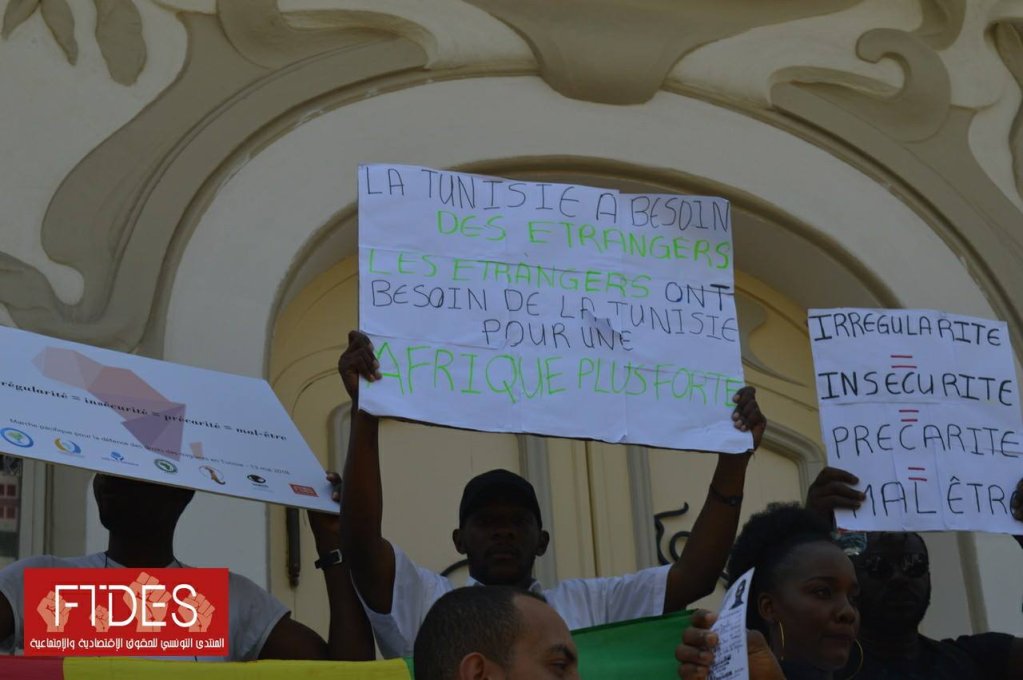Tunisian authorities have suspended the activities of several NGOs in recent days, including one major migrant rights advocacy group. For the time being, the halt on operations slapped on the NGOs is valid for one month.
The Tunisian Forum for Social and Economic Rights (FTDES) has become the second NGO to be suspended in Tunisia in recent days.
The prominent civil rights and migrant advocacy group said in a statement published on Monday (October 27) that it had received an official letter informing it "of the suspension of its activities for a month under a procedure already applied to other organizations."
FTDES stated that the suspension amounted to "a new incident in the restriction of independent civic space and a flagrant attempt to subjugate free voices who have refused to swear allegiance [to the Tunisian government] and remained true to the values of justice and dignity."
FTDES official Ramadhan Ben Omar told the Reuters news agency that in his view, the "real aim" behind the suspension was "to silence every independent voice within civil society."
On October 24, a similar suspension was slapped on the Association of Democratic Women (ATFD) — a charity involved in advocating democratic values and women's rights in the North African country since 1989.
Read AlsoSurvey: Majority of sub-Saharan migrants in Tunisia don't trust NGOs
About 50 groups believed to be in government's crosshairs
Anonymous sources close to the government have told Reuters that at least a dozen other charities are being targeted in this latest crackdown on civil society groups.
Local media in Tunisia meanwhile have corroborated that prosecutors launched similar investigations into numerous other civil society organizations believed to receive foreign funding for running their operations — rather than funding their work with local support.
According to some reports, a total of 47 organizations and associations have also been dissolved as a result of various investigations already carried out, while authorities are believed to also have frozen the assets of 36 others.
Furthermore, at least 12 prominent civil society activists are currently believed to be in prison on various charges linked to their work in Tunisia.
Read AlsoTunisia arrests human rights activist who defended migrants
FTDES: Saied's arch-nemesis in migration debate
Without naming the reason for the suspension cited by authorities in the letter, FTDES highlighted that it had been subject to "a series of financial and tax audits since April" of this year.
The group said it had "conformed to all legal and administrative procedures," adding that moving forward, it would also continue to comply with investigations following what it referred to as the "arbitrary and unjust" government decision to suspend its activities.

FTDES' main objective is to gather data on migration trends, focusing in particular on human trafficking of migrants from Tunisia and sub-Saharan Africa, the rights of female farm workers and the effect of environmental pollution on migration patterns.
The group occasionally also participates in pro-migrant rallies — a thorn in the side of Tunisian President Kais Saied.
Read AlsoTunisia: FTDES denounces authorities' silence on migrant deaths
A personal vendetta?
FTDES was one of the first organizations to counter the president's claim in 2023 that there was an alleged "criminal plot" to change Tunisia's Arab and Muslim identity by allowing in sub-Saharan migrants.
At the time of Saied's 2023 statement, FTDES went as far as publicly denouncing his stance as being racially motivated.
Saied's ideas have also repeatedly been debunked as extensions of existing conspiracy theories such as the so-called "Great Replacement Theory.”
Read AlsoTunisia: Presidential scapegoating stokes fear and support
Tunisia's gradual descent into autocracy
Saied, who has been serving as Tunisia's president since late 2019, consolidated much of his power in 2021 in what has been called a self-coup orchestrated by the divisive leader — with critics accusing the president of ruling Tunisia by decree ever since.
Tunisian and foreign NGOs have noted a sharp regression in rights and freedoms in the country ever since the events of 2021, with migrants being particularly targeted as part of the President's autocratic-style rule.
There have been repeated accounts of migrants being rounded up in urban areas by authorities under the president’s directives, to then forcefully be moved to the desert in the south of the North African country, where they are allegedly left to fend for themselves.
Read AlsoUN alleges Tunisian border guards rounded up migrants and passed them to Libya
Reports of deaths from exposure, exhaustion, hunger and thirst have been amassing in recent years, with mass graves along the Tunisian-Libyan border being found on several occasions.
The Tunisian government has thus far not responded to media requests to comment on the latest developments.
Read AlsoUN discovers mass grave of migrants along Libya-Tunisia border
with AFP, Reuters
